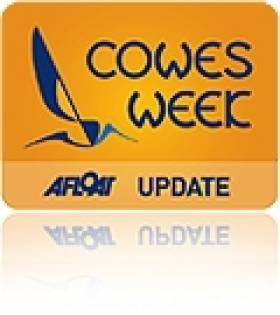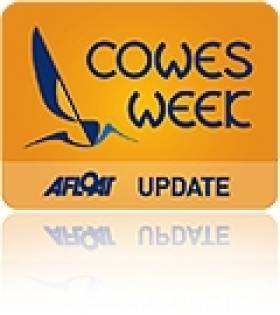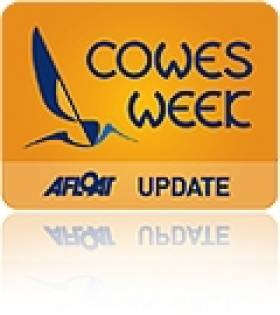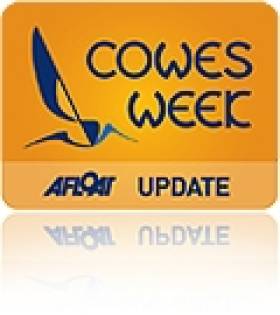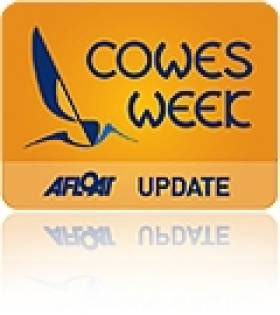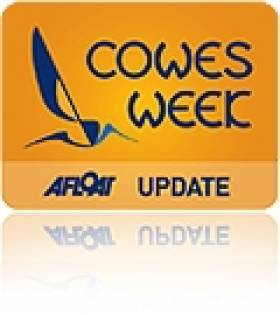Displaying items by tag: Cowes Week
Cowes Week Big Boat Action on Day Five
#cowes – Big Boat action at Aberdeen Asset Management Cowes Week with some electrifying video action and special guests including British Olympic rowing legend, Sir Matthew Pinsent out on the water with Azzam's skipper,Ian Walker.
Plus Dee Caffari, Oman Air-Musandam talking about the first female crew member Raiya Al Habsi having a great opportunity to sail in the Fastnet.
J/70 Sportsboat Winners Announced at Cowes Week
#J/70 – Ruairidh Scott, Charlie Cumbley, Hugh Fletcher and Matt Curthoys, the team on board the J/70 North Sails, were yesterday pronounced as the winners of the J/70 Short Series at AAM Cowes Week 2013. The Jaques family were second in Django and Simon 'Sling' Ling and crew finished third in Team RAFBF Spitfire.
Almost exactly one year after the very first J/70 Sportsboat arrived in the UK, (one J/70 arrived in Dublin Bay this season) this brand new one-design fleet were offered a Class Start at AAM Cowes Week and better still, the J/70s were able to compete in two races each day from Saturday 3rd of August to Tuesday 6th of August in the J/70 'Short Series'. The J/70s were the first fleet to start off the Squadron line each morning and then raced the second race from a committee boat start-line, finishing off Cowes. It was a race format which worked extraordinarily well for the fleet and which everyone agreed delivered great racing and superb competition.
Racing in the J/70 fleet at Cowes was both extremely close and incredibly exciting; in the first race on Sunday 60% of the fleet crossed the finish line in an 83 second period! It is clear the J/70 is not only great fun to sail but that the class delivers absolutely first rate competition. Heading into the AAM Cowes Week Short Series, the smart money may well have been on the North Sails team as they are the current J/70 UK National Champions, but as Ruairidh was the first to point out, the fleet is getting hotter and hotter all the time and the standard of sailing is improving at every event so it was far from an easy win.
Certainly Ruairidh and his team did not have things all their own way. The Jaques family team won two of the six races completed in Django (racing for all classes at Cowes was abandoned on Tuesday when the breeze failed to show up on the course) and kept the pressure on Ruairidh from the off, starting the regatta with a win in Race 1. Malcolm said 'It made sense for Tristan to helm the boat and I slipped into the tactician's role with my daughter Naomi doing navigation and strategy. Tristan is clearly a very quick driver but it's not just that: his reactions are also faster than mine and that is crucial to success in this fleet. Tristan was able to really keep 100% of his focus on boat-speed'.
At the close of the series North Sails had notched up just six points, Django had eight on the score card and Team RAFBF Spitfire clocked 18. Ruairidh and his crew were clearly thrilled to have won.
Ruairidh explained 'We've had a great regatta. We've certainly been under lots of pressure from the rest of the fleet at this event, especially Django, but my crew worked really hard and kept their focus from start to finish taking any little knock back in their stride.' He continued 'I would like to say hats off to the organisers for taking the decision to run two races a day. It has transformed the event for us: two shorter races really keep the interest levels up. The key elements of our success here at AAM Cowes Week include having good all round boat speed, a crew with a thorough knowledge of The Solent and 100% concentration from the whole team.'
Racing continues for the J/70 Class at AAM Cowes Week today although with the more traditional and relaxed 'one race a day' format. The next major event for the J/70 Class is the J-Cup later this month in Plymouth and then the UK teams will be packing their boats up and heading down to glorious Lake Garda for the J/70 Euro Champs in September.
Cowes Week Day Three & Strong Winds for Princess Royal Visit
#cowesweek – The third day of Aberdeen Asset Management Cowes Week dawned with unpromising weather forecasts – at one stage the Met Office's Inshore Waters forecast predicted winds up to Force 9 – although in the event the strongest gusts were below 25 knots and in line with the regatta's meteorologist Fiona Campbell's predictions.
O'Leary Enjoys Cowes Week Lead on Corby 36, Yes!
#cowesweek – Royal Cork's Nicholas O'Leary, and a number of crew from the Irish IRC champion yacht Antix, enjoyed glorious sunshine on board Adam Gosling's Yes (Corby 36) today in the second day of Cowes week, Britian's biggest regatta. O'Leary helped the British entry into the lead in the 34-boat IRC 4 strong class.
Temperatures already reaching 20 Celsius by mid morning, and a wind that's slowly building in strength are giving another day of excellent racing in the Solent. By late morning the breeze had built to 8-12 knots inshore close to the Island, but up to 15 knots with occasional stronger gusts in the central Solent, although it was still very shifty, with the mean direction varying through 30 degrees.
A good dose of sun and wind that slowly built in strength from 8-12 knots for the early starts to gusts of more than 20 knots during the early afternoon gave more great racing for Family Day at Aberdeen Asset Management Cowes Week. The breeze was very shifty, with the mean direction varying through more than 30 degrees and big lulls that saw the wind speed drop by more than 50 per cent between the gusts.
This both challenged competitors, who had to constantly change gear to keep their boats moving at optimum pace, and gave the course setting teams a challenging morning to provide fleets with the best chance of decent upwind legs, despite the changing conditions. By the time the early Black Group yachts were finishing, the wind had built to give large gusts off the shore, treating competitors to quick spurts of downwind speed and spectators to a number of classic broaches and near misses as boats lost control.
Among the mishaps today were son and father team Rupert and John Mander, who have consistently won the two-person Flying 15 class in Men Behaving Badly for many more years than most can remember. During today's race John fell out of the front of the boat – Rupert turned round and rescued his Dad without losing too much time, but the duo had to settle for an uncharacteristic second place, 28 seconds behind Nick Clarke's Black.
Close competition in Black Group
Yesterday the 25 entries in the J/109 class proved that competition between these boats remains very close, with an average of just 43 seconds separating each of the first 17 boats. Today the class was all clear at the start, despite an ebb tide sweeping them over the line. Starting towards the northern end of the line William Edwards' Sardonyx lX initially appeared to be best placed and benefited from clean air. However, it was the boats that started at the Island end of the line that gained the overall advantage.
By the finish it was Jonathan Calascione and Jonnie Goodwin's Harlequin, last year's class and Black Group overall winner that took the win, after another closely-contested race. Tor Mclaren's Inspara finished second, just 16 seconds later, with Ross Walker's Juno taking third another 42 seconds after that. There was also tight competition further down the fleet – at the end of the three and a half hour race little more than two minutes separated the eight boats in places 8 to 15.
This year the Contessa 32 class has a slightly larger fleet than for some time, with a number of boats returning to the race course for the first time in several years. Today, yesterday's winner Ray Rouse's Blanco, led them away from the start. However he was overtaken by Eldred Himsworth's Drumbeat, which finished a shade over two and a half minutes ahead of Rouse.
The next start on the Bramble line was for IRC Class 6, which saw two boats over the line at the gun. One of these was the largest boat in the fleet, David Glasgow and The Earl of Cork and Orrery's classic varnished International 8 Metre Athena, which swiftly tacked onto port in a gap between boats after the gun to return to restart from the correct side of the line. One of the lowest-rated boats in the class, Rory Fitzwilliams' 37 year old Three-Quarter Tonner Simplicity had another good start, but was unable to save her time on line honours winner, Bob and Jon Baker's X332 Brightwork, or Justin Leese and Mark Brown's Figaro 1 Black Diamond, who respectively took first and second overall on corrected time.
White Group
The J/80 fleet was much more cautious at the start than the Darings had been 10 minutes earlier. At the gun Chris Body's Swallow and Mark Greenaway's Peloton looked best placed at the outer end of the line. However, long-standing Cowes Week competitor Colin Simonds' Doolalli, who sails with different family members every day, started further inshore, tacking on the line just before the gun. He was soon passing the leaders to windward, pointing higher and appearing to sail faster than the competition through the gusts, holes and shifts off the Green, as the fleet made its way upwind to the first mark. Simonds' early lead helped him secure his second second place in two days, but yesterday's winner, Chris Taylor's J.A.T., finished almost four minutes ahead to take another win.
The Dragon class started closer to the line than the J/80 fleet, with most boats approaching on starboard, before tacking immediately onto port. Graham Bailey's Aimee was best placed towards the inshore end of the line and in clean air, getting away quickly from Chris Brittain's The Old Bailey on her leeward quarter. Simon Barter's Bertie, a newcomer to the Cowes fleet this year, having previously raced a very successful Sonar of the same name, was sailing higher and faster than Brittain and pulled into second place just three minutes after the start.
When a lull combined with a 25 degree unfavourable windshift slowed Aimee, it looked as though she would lose her early advantage, however, her crew changed gear with perfect coordination in the next lifting gust and pulled comfortably ahead again. At the finish of the two-and-a-half hour race Aimee crossed the line 52 seconds ahead of Gavia Wilkinson-Cox's Jerboa, to take a second consecutive win.
In the RS Elite class Martin Wadham's Kiss looked best placed of the boats at the offshore end of the line. However, it was Jono Brown's Aeolus, tacking onto port in the middle of the line at the gun that initially appeared to hold the advantage over the fleet as they negotiated the many puffs, lulls and windshifts off the Green. Yesterday's winner, Crauford McKeon's Kandoo lll, just to leeward of Aeolus, managed to keep pace and only fractionally lost height despite her relatively disadvantaged position. Kandoo lll continued to push hard around the 15.8 mile course, finishing more than a minute ahead of Wadhams, who took second place and Jonathon Proctor's Wombat in third.
Sport for all in the Sonar class
The 13 boats in the Sonar class this year has a wide mix of competitors, including the Paralympic Girls Team of Hannah Stodel, Megan Pascoe, Carol Dugdale, Bella Walsh and Megan Harris and Spare Part, a boat crewed by former soldiers undergoing rehabilitation, including a triple amputee and two double above the knee amputees who have been training with the support of RYA Sailability and the Andrew Cassell Foundation.
In today's race Alistair Barter (son of Simon, who is racing his new Dragon this week) and Ed Suckling's Bertie was best placed of the boats that started towards the outer end of the line. David Peerless' Miscreant, one of the nine Sonars available for charter from the Island Sailing Club, started mid line. For the first couple of minutes she trailed the pack a little, but was then first to hook into a favourable windshift, gaining a useful advantage over the rest of the fleet.
However, by the finish it was Andy Cassell's (who won the gold medal in the class at the 1996 Paralympic sailing demonstration event) Jenny that crossed the line first, 80 seconds ahead of Barter and Suckling, who are themselves starting a Paralympic campaign, and took second place today. The Paralympic Girls Team took third, pushing Peerless into fourth place, just nine seconds ahead of Rosy Jones, who was sailing another ISC boat, Biscuit.
Spare Part took eighth place today, narrowly missing out on a much better position after breaking a jib halyard block. "The team had a fantastic race and the course was really good," says RYA Paralympic Development Coach Matt Grier, who was on board for today's race. "It's still early days for the team – they are only part way through rehab – and it was Craig Wood's [a triple amputee] first experience of helming with the spinnaker up."
J70 Design Debuts at Cowes week
#cowesweek – Nine boats has given the J70 design its first start in Cowes week this week as the new 22–foot sportsboat class debuts on UK and Irish waters, the latest addition to Britain's biggest sailing regatta.
With 800 boats competing, Cowes week is twice the size of its Irish counterpart, Volvo Dun Laoghaire Regatta.
Sunday's day 2 of the Aberdeen Asset Management sponsored event looks set to produce some good breezes and bright sunshine.
The forecast is for a warm and clear day with a classic steady south-westerly airflow of 16-20 knots in the western Solent, with the breeze likely to be a little less strong and slightly veered towards the west-north-west in the eastern Solent.
Large windshifts and gusts to around 25 knots will be experienced at the edge of any clouds that pass overhead, making for exciting and tactical racing.
Stuart Quarrie, CEO Cowes Week Limted, commented on the weather situation: "Although there is a low pressure system off the coast of Cornwall that's moving west, it is tracking slowly. The lighter airs early in the day are likely to be very shifty, with oscillations between 180 and 230 possible, although as the breeze strengthens it's likely to become a little more stable around 210 degrees."
As far as courses go, Black Group will start from both the Bramble/Royal Yacht Squadron line and from a committee boat, and finishing off the Royal Yacht Squadron line (RYS).
The first Black Group start from the Bramble line is IRC1 at 1030. This class is racing for the Glazebrook Challenge Cup. The Black Group committee boat first start for Multihulls is at 1100. Black Group committee boat will be positioned near Browndown, with racing taking place in the eastern Solent. Classes starting here will have a possible committee boat finish at the end of a windward leg, rather than joining the rest of Black Group in a finish from the west on the RYS line.
The majority of the White Group will start from the RYS line, initially head west before heading to the eastern Solent. They will finish at Shrape.
White Group committee boat for XODs and the second race for J/70s and SB20s will be close to William Shipping, near the north shore, close to the entrance to Southampton Water. For the first time ever the new Bramble finish line will be used for some of the White Group classes.
Gill Launch Race Collection ahead of Cowes Week
The Gill Race Collection consists of 13 products, all extremely breathable, lightweight and have a UV protection factor of 50+. Highlights include the Race Jacket that is more than 15% lighter than any comparable product in the market place today and the Race ¾ Tights - a design-first, incorporating a foam pad to protect against painful chaffing on the rail and means that even after a full week racing in Cowes sailors will still be hiking hard.
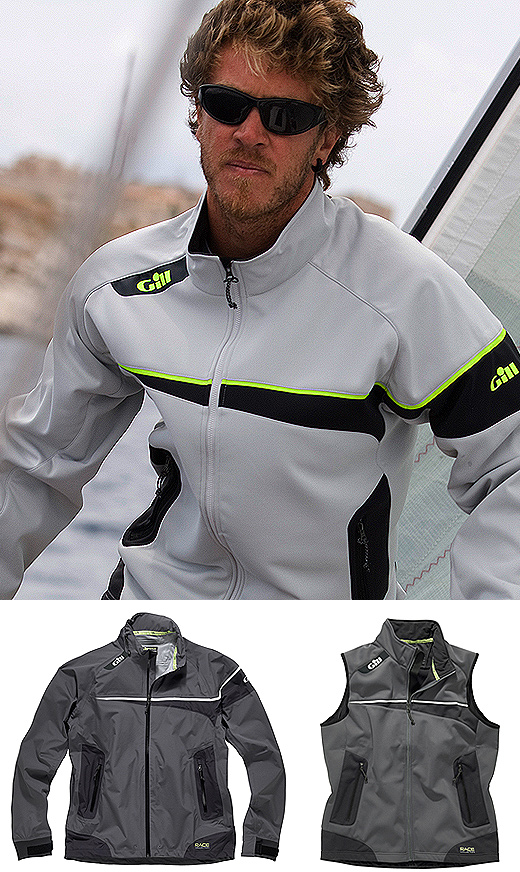
With events like Cowes Week in mind, the Race Collection is specifically designed for performance in hot and sunny conditions. Anyone on the water in the Gill technical kit will enjoy total freedom of movement in breathable clothing that will not only protect them from the wet, but also the harsh effects of ultraviolet radiation. Gill specialises in total protection whatever the weather; and the Race Collection has three layer categories: lightweight waterproof jacket, smock and trousers; Softshell; and 'next to skin' products which include T-shirts, shorts and accessories. The layering system ensures comfort in all conditions and provides crews with a winning edge in performance and style.
The Gill Race Collection is available to purchase throughout Cowes Week from the Gill retail tent situated in the Yacht Haven and from the Aquatogs store on Cowes High Street, and online at www.gillmarine.com
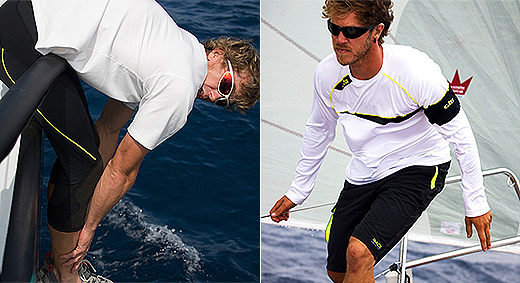
Cowes Week Radio Celebrates 25 Years
Streamed on the internet around the world at http://www.cowesradio.co.uk and listened to by many thousands of competitors and spectators attending Cowes Week on 87.7fm through speakers on Cowes Parade, the Green and through personal earpieces on the boats, the reporting and programme content provides an eclectic mix of regatta highlights, interviews and entertainment. More crucial information is included for competitors, with dedicated and detailed local weather reports, tide times and the all-important race results being broadcast.
Throughout each day, a major highlight is the opportunity to listen in to the live, on-water commentary from Dick Johnson on all the sailing action with minute-by-minute information 'fed' to competitors from a fully instrumented commentary boat and Simon Vigar in a privileged position on the Royal Yacht Squadron platform.
Cowes Week is among the UK's longest running and most successful sporting events - staging up to 40 daily races for over 1,000 boats and is the largest sailing regatta of its kind in the world. Getting the boats to the start line on time and announcing the courses is an essential part of the Cowes Radio service. The 8,500 competitors and 100,000+ spectators can tune-in throughout the day for sailing, social and personal chat. The rest of the world listens in on the website and emails in requests and comments.
25 years ago when Dick Johnson was at Yachting World the first Restricted Service Radio Licences were created for short term use at sporting events such as football and athletics stadiums. The small print having been studied, the bigger arena of the Solent and Cowes Week came into view. The Radio Authority admitted it might have been outside the intention of the new licences, but was within the wording. Regatta Organisers, Cowes Combined Clubs (CCC), immediately saw how radio could enhance the event for the participants and help the organisers. Approval from the Royal Yacht Squadron was secured.
Way back then, Dick knew only one person in radio - Steve Ancsell who hosted a weekly sailing and boating programme on the now defunct Radio Victory. Steve 's media company Airwaves had the expertise and equipment that enabled the first Cowes Radio in 1985. Steve controlled activities from a caravan under the Royal London Yacht Club's flag mast. Dick stood by the RYS guns with a radio microphone transmitter and binoculars - chatting about whatever went on.
Cowes Radio was born and has gone from strength to strength. A much loved part of the regatta scene – with Dick, a rusty walnut colour, a great favourite of one and all.
Cowes Radio has also been present at notable occasions outside Cowes Weeks, such as various Admiral's Cups and the America's Cup Jubilee. Although the official radio station appointed by CCC, it remains independent of the organisers of Cowes Week and survives through its sponsors and advertisers. The majority of staff are radio and television professionals who take a week of their holidays to come back year after year.
Comments Steve: "A huge dept of gratitude is owed to all the supporters of Cowes Radio over the last 25 years: major sponsors, especially Nanny Cay, eDigital Research, Skandia of course and many, many more. Raymarine the providers of sailing instruments for the commentary boat; advertisers; the exceptionally talented and loyal reporting and back-up teams. They are the ones who make it possible for us to be on air year after year".


























